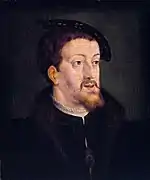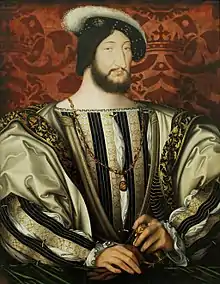1519 Imperial election
The imperial election of 1519 was an imperial election held to select the emperor of the Holy Roman Empire. It took place in Frankfurt on the 28th of June.
Background
The election followed the death of Maximilian I, Holy Roman Emperor on January 12, 1519. There was no German contender; the two main candidates were Charles, duke of Burgundy, king of Spain and archduke of Austria, and Francis I of France, king of France. Henry VIII of England, king of England, entered himself as a candidate as well. Although Charles was head of the House of Habsburg after the death of his grandfather Maximilian, he had grown up in the Burgundian low countries, stayed in Spain at the time of the election, and spoke French rather than German. He was thus felt to be as much of a foreigner as Francis. While electing an emperor who was also the ruler of a foreign power had not happened since the king of Sicily Frederick II, Holy Roman Emperor was elected in 1212, France and the Empire had not been joined since the days of the Carolingian dynasty.
The seven prince-electors called to elect Maximilian's successor were:
- Albert of Brandenburg, elector of Mainz
- Richard von Greiffenklau zu Vollrads, elector of Trier
- Hermann of Wied, elector of Cologne
- Louis II of Hungary, king of Bohemia
- Louis V, Elector Palatine, elector of the Electoral Palatinate
- Frederick III, Elector of Saxony, elector of Electorate of Saxony
- Joachim I Nestor, Elector of Brandenburg, elector of Brandenburg
Charles could count on the vote of Louis II, who was married to his younger sister Mary of Hungary. He and Francis competed to exceed one another in their bribery of the remaining electors.
Elected
Charles in the end had deeper pockets. Francis had bought the elector of Trier; up for grabs were the electors of Mainz, Brandenburg and the Palatinate. Although full details of the election were never revealed, it is possible that the electors sought a way out of their dilemma by electing Frederick III as emperor, but that he turned them down. In the end, Charles was elected unanimously, though with some misgivings by the elector of Brandenburg. He was crowned at Aachen on October 26, 1520.
Charles was also able to win, as he used the threat of military force from the Swabian League-formed in 1488, that was sympathetic towards Charles' Habsburg background.
Charles underwent a relentless propaganda campaign in which he shifted the narrative to claim his heritage as a German, as well as being the grandson of Maximilian (previous Holy Roman Emperor), was of substantial reason to elect him as Holy Roman Emperor, coining the phrase 'German by blood and stock.' Consequentially presenting him as obtaining 'German sympathies', making his election more attractive. At the same time, Charles' superiority caused his competitor Francis, to become nothing more than a 'foreign adventurer', fostering fears of foreign interference in German affairs. In contingency with this notion, Charles was also the ruler of other states in Spain and the Netherlands, therefore, it was less likely that he would impose his personal ambitions as he would be pre-occupied on his other affairs. Such displacement, made election that much more attractive than his competition.
Aftermath
Charles was crowned Holy Roman Emperor by Pope Clement VII in Bologna on February 22, 1530. He was the last emperor to accept the papal coronation.


.jpg.webp)
